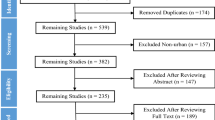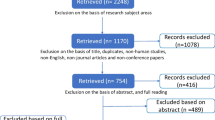Abstract
This article is a conceptual contribution on how to make human habitat more sustainable. Taking Heidegger’s conception of “dwelling” as a starting point, a new form of understanding the organization of the city as a human habitat is proposed. It is argued that human habitat is today in crisis and that such crisis has its roots in a spatial understanding of human dwelling, disregarding its temporal-historical dimension. For long time, the city has been considered as a physical “place” and its organization—the urban planning—has been addressed in terms of “locating” (building). Many of the challenges in organizing habitat are the result of reducing the organization of the city to the organization of physical space. One of these is the conflict between preservation and development, a central issue in approaching sustainability. The aim of this article is to propose a new perspective on the organization of human dwelling, which overcomes the spatial-based conception of habitat and involves its temporal dimension. The meaning of human “habitat” as a historical process for developing “habits” will be recovered, and the implications for organization of the city considered. Human habitat is above all an ethical space (ethos), constituted in a spatial–temporal process of developing learning and capabilities. This habitat can be shared and developed infinitely so that a pathway is opened for overcoming the logic of competition and the conflict between sustainability and development. Finally, three forms of the human habitat as an “ethical space” are proposed.
Similar content being viewed by others
References
Arendt, H. (1998). The human condition. Chicago: The University of Chicago Press.
Aristotle. (1984a). Nichomachean ethics. In J. Barnes (Ed.), The complete works of Aristotle (Vol. 2). Princeton: Princeton University Press.
Aristotle. (1984b). Physics. In The complete works of Aristotle, Vol. 1.
Aristotle. (1984c). Politics. In The complete works of Aristotle, Vol. 2.
Bañón, A. J., Guillén, M., Michael, W., & McNulty, R. E. (2011). Rethinking the concept of sustainability. Business and Society Review, 116(2), 171–191.
Bansal, P., & DesJardine, M. R. (2014). Business sustainability: It is about time. Strategic Organization, 12(1), 70–78.
Barry, B. (1997). Sustainability and intergenerational justice. Theoria, 89, 43–64.
Beguinot, C. (1993) Urbanistica de la comunicazione e la valutazione del cambiamento. In Padovano, G., (Eds.), Verso il moderno futuro. Nuove strategie per il territorio della complessità (pp. 57–62).
Borovik, E., (1993). L´evoluzione delle strategie per lo sviluppo dei territori urbanizzati della Russia. In: Padovano, G. (Eds.), Verso il moderno futuro. Nuove strategie per il territorio della complessità, (pp. 67–84).
Boudon, R. (1982). Logic of social action: An introduction to sociological analysis. London: Routledge Kegan and Paul.
Cresswell, T. (2004). Place: A short introduction. Malden, MA: Blackwell.
Dekkers, W. (2011). Dwelling, house and home: Towards a home-led perspective on dementia care. Medical Health Care and Philosophy, 14, 291–300.
Fergus, A. H. T., & Rowney, J. I. A. (2005). Sustainable development: Lost meaning and opportunity? Journal of Business Ethics, 60, 17–27.
Gehlen, A. (1988). Man: His nature and place in the world. New York: Columbia University Press.
Gibson, K. (2012). Stakeholders and sustainability: An evolving theory. Journal of Business Ethics, 109, 15–25.
Gleye, P. H. (2015). City planning versus urban planning: Resolving a profession’s bifurcated heritage. Journal of Planning Literature, 30(1), 3–17.
Guthey, G. T., Whiteman, G., & Elmes, M. (2014). Place and sense of place: Implications for organizational studies of sustainability. Journal of Management Inquiry, 23(3), 254–265.
Hartman, L. M., & Prytherch, D. (2015). Streets to live. Justice, Space, and Sharing the Road, Environmental Ethics, 37(1), 21–24.
Heidegger, M. (1971). Building dwelling thinking. In M. Heidegger (Ed.), Poetry, language, thought (pp. 145–159). New York: Harper and Row.
Heidegger, M. (1996). Being and time. New York: State University of New York Press.
Imbesi, G. (1993). Al di là delle periferie: rirovare le regioni dei luoghi. In Padovano, G. (Eds.), Verso il moderno futuro. Nuove strategie per il territorio della complessità, (pp. 97–111).
Intezari, A., & Pauleen, D. J. (2014). Management wisdom in perspective: Are you virtuous enough to succeed in volatile times? Journal of Business Ethics, 120, 393–404.
Kant, I. (2002). Groundwork for the metaphysics of morals, edited and translated by Allen W. Wood, New Haven: Yale University Press.
Kenny, A. (1979). Aristotle’s theory of the will. London: Ducworth.
Lawrence, T. B., & Dover, G. (2015). Place and institutional work: Creating housing for the hard-to-house. Administrative Science Quarterly, 60(3), 371–410.
Ley-Cervantes, M. (2014). Home. Environment, Space, Place, 6(1), 76–77.
Light, A. (2003). Urban ecological citizenship. Journal of Social Philosophy, 34(1), 44–63.
MacIntyre, A. (1984). After virtue. Notre Dame: University of Notre Dame Press.
Malpas, J. (2014). Rethinking dwelling: Heidegger and the question of place. Environmental & Architectural Phenomenology, 15(1), 15–23.
Nietzsche, Fr. (1976). Thus spoke Zarathustra. The Portable Nietzsche. New York: Penguin Books.
Ozolins, J. T. (2010). Popper’s third world: Moral habits. Moral Habitat and their Maintenance, Educational Philosophy and Theory, 42(7), 742–761.
Padovano, G. (1993). Verso il moderno futuro. Nuove strategie per il territorio della complessità. Firence: Alinea Editrice.
Proscurcin, P. (2014). Der Begriff Ethos bei Homer: Beitrag zu einer philosophischen Interpretation. Heidelberg: Winter.
Raatzsch, R. (2012). On the notion of sustainability. Inquiry: An Interdisciplinary Journal of Philosophy, 55(4), 361–385.
Relph, E. (1976). Place and placelessness. London: Pion.
Reynolds, N. (1993). Ethos as location: New sites for understanding discursive authority. Rhetoric Review, 11(2), 325–338.
Scheeren, O. (2015). Why great Architecture should tell a story. Accessed 11 December 2015. http://www.ted.com/talks/ole_scheeren_why_great_architecture_should-tell_a_story.
Sen, A. (2011). The ends and means of sustainability. Journal of Human Development and Capabilities: A Multi-Disciplinary Journal for People-Centered Development, 14(1), 6–20.
Sevtusk, A. (2014). Location and agglomeration: The distribution of retail and food businesses in dense urban environments. Journal of Planning Education and Research, 34(4), 374–393.
Swanton, C. (2010). Heideggerian environmental virtue ethics. Journal of Agricultural Environmental Ethics, 23, 145–166.
Walter, E. V. (1980–1981). The places of experience. Philosophical Forum, 12, 159–181.
Webber, M. (1963). Order in diversity: Community without Propinquity. In L. Wingo (Ed.), Cities and space. Baltimore: Johns Hopkins Press.
Webber, M. (1964). The urban realm and the nonplace urban realm. In M. Webber, et al. (Eds.), Explorations into urban structure (pp. 79–153). Oxford: Oxford University Press.
Whiteside, K. H. (1994). Hannah Arendt and ecological politics. Environmental Ethics, 16(4), 339–358.
Author information
Authors and Affiliations
Corresponding author
Rights and permissions
About this article
Cite this article
Bastons, M., Armengou, J. Human Habitat, Space and Place. J Agric Environ Ethics 29, 559–570 (2016). https://doi.org/10.1007/s10806-016-9617-8
Accepted:
Published:
Issue Date:
DOI: https://doi.org/10.1007/s10806-016-9617-8




